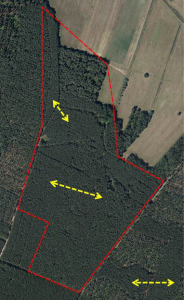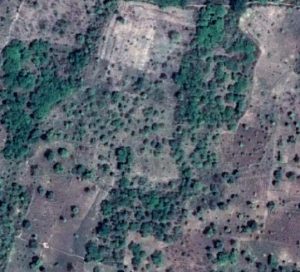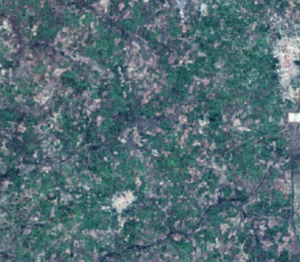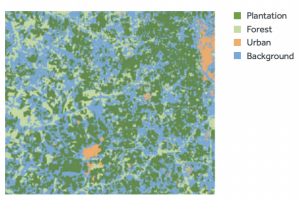
Remote Sensing and Satellite Imagery Providing Data for African Cashews
Emerging technology solutions combining aerial and phone imagery with machine learning could solve long-standing challenges in getting accurate, timely data for trade and investment decisions in the global nut and dried fruit industry.
Editor’s note: This article originally appeared in the July 2021 issue of Nutfruit Magazine, an initiative of the International Nut and Dried Fruit Council (INC) that provides readers with incredible insight into the nut and dried fruit industry.
Market data is a critical input for the nut and dried fruit industry, whether regarding production, demand, or quality. Yet for a number of products, data is often scarce, late, or unreliable.
This is due to several factors, including products that are wild-grown, grown by huge numbers of small producers, or produced across many geographies which may lack the capacity to collect and publish statistics and monitor quality. These challenges can be compounded when different entities are using different standards, making available data difficult to combine into a big picture.
But, while some issues may persist until public policy is able to fill in the gaps, emerging technology in satellite and aerial imagery, combined with mobile phone capabilities, hold the promise of “lifting the veil” and improving business intelligence in the industry. This technology may even become standard in developing future market reports.
With more than 20 years’ experience working in the cashew sector in Africa and India, the international development nonprofit, TechnoServe, has become deeply familiar with the challenges in determining basic facts about the industry. In most cashew-producing countries in Africa, reliable data on the number of farmers, production area, and productivity are simply unavailable or are speculative estimates.
Annual harvests are typically estimated post-season based on patchy trade data and anecdotes from the biggest traders. Furthermore, buyer and seller frequently disagree on the quality of a given lot of product, leading to disputes, breakdowns in trust, and higher transaction costs. This forces both business and government to guess where, when, and how much to invest.
Fortunately, there is a promising solution using emerging technology. The availability of aerial imagery and digital data is increasing exponentially, while machine learning to analyze that data has begun to mature.
TechnoServe set out to see if we could harness this evolving technology to improve production and income for the more than 70,000 smallholder cashew farmers we work with in Benin. Partnering with the University of Minnesota and Planet Labs (a satellite data provider), we formed an advisory board across the spectrum of technology companies to help us chart a course.
One of the first challenges we encountered was in mapping farms. Most cashews are grown by smallholder farmers with highly irregular, intercropped farms. This is an especially hard problem for a computer to understand and solve, and as a result, most existing technology providers have focused on large farms like this:

But our cashew farms in Africa look more like this:

Overcoming that technical challenge required us to deploy our teams on the ground to manually map a large area in minute detail. The research team at University of Minnesota then further refined this map. Although this work took months, it paid dividends – with a large sample, the machine learning program was able to learn enough to identify cashew plantations in new areas with 85% accuracy.


On the top, a satellite image covering central Benin; on the bottom, the algorithm’s identification of cashew plantations (orchards) within that image.
For the first time, we were able to produce a detailed map of cashew plantations without the expensive and laborious process of sending extension workers to comb the countryside to identify and map the farms.
Even better, because historical data is available, we were able to learn some high-level facts about production trends. For instance, we saw that in this area of central Benin, the amount of land planted with cashew had increased by 30% over the past five years. This suggests that production will continue to increase by 30%-50% over the next five years, because younger, more recently planted trees are more productive.
This demonstration is only the start. We are currently working to expand our analysis to all of Benin, and soon after, to Mozambique, where cashews also represent an important crop to smallholder farmers and the national economy. As we do so, we are working to connect this analysis to other farm data. In Mozambique, TechnoServe has assisted the government in setting up a national digital farmer and traceability database covering 200,000 farmers to help improve input subsidies; across several countries, we produce or contribute to national yield surveys.
By combining this data we are trying to both improve its accuracy and to produce new statistics, including quality and disease monitoring and eventually, yield forecasts. We are also looking to expand to other tree crops facing similar data challenges, such as coffee.
Most importantly, we are collaborating with private software providers to put tools directly in the hands of buyers, extension officers, and supply chain managers to access relevant, timely, and detailed market information to aid in decision-making and manage their farmer and supplier networks. Based on our experience, it appears likely that satellite data will become a key basis for agricultural statistics, like those published by INC, for crops like cashew in the next few years.
TechnoServe is also developing and releasing tools at the individual transaction level, including the Caju app, available in English, French, and Portuguese. The app was designed with the small-scale African farmer and village trader in mind, to improve understanding and measurement of basic quality aspects at the farmgate and post-harvest storage level.
In support of TechnoServe’s mission to eradicate poverty through business solutions, we are interested in solving the market and supply chain challenges that limits the growth and profitability of the nut and dried fruit sector in emerging markets. Key to achieving that mission is partnering with the private sector to identify the barriers and develop market-based solutions.
Read more about TechnoServe’s work with emerging technology.





